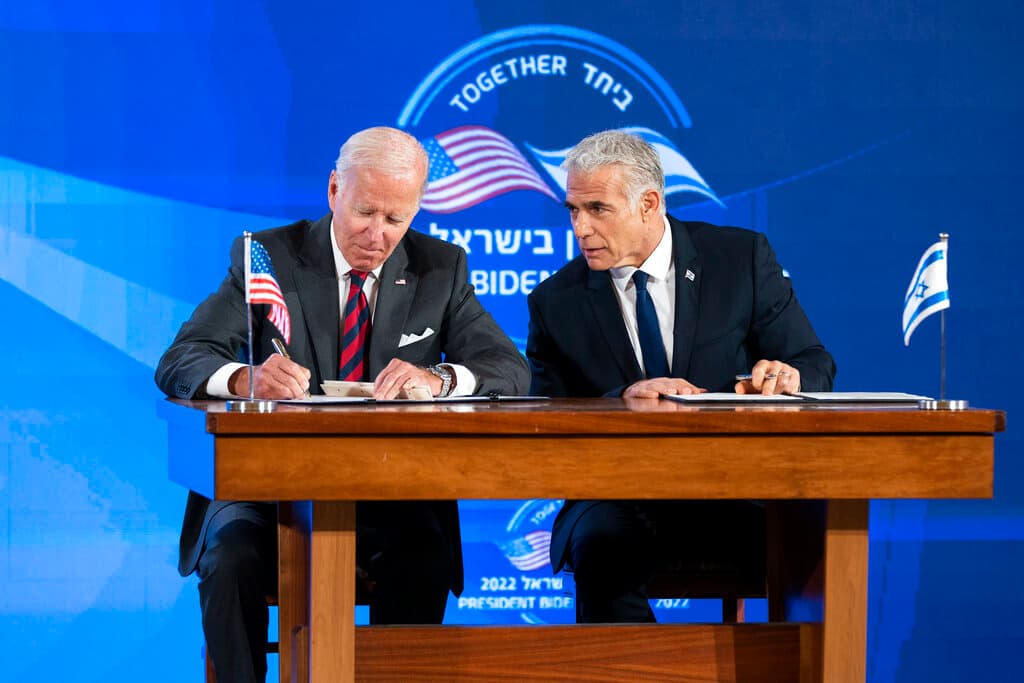Icy Reception Awaits Biden in Saudi Arabia
Will the hand of the prince, which the president considers too blood-soaked to shake, be shook?

Alas, poor President Biden. Tomorrow’s reception at Jeddah for the leader of the free world is widely expected to be icy. Flying in from Israel, where he felt a kind of love that increasingly escapes him at home, the president in Saudi Arabia will likely experience a rough landing.
At Ben Gurion airport, Mr. Biden was received yesterday by Prime Minister Lapid, his full cabinet, and the entire who’s who of Israeli politics, including the opposition leader, Benjamin Netayahu. While some disagreements came out in the open, the two-day visit seemed like an extended party.
At the Jeddah airport, in contrast, Mr. Biden will be received by Deputy Governor Prince Badr bin Sultan bin Abdulaziz of the province of Mecca, which includes the holy city. The aging King Salman and his son, Crown Prince Mohammed bin Salman, the de facto ruler who is commonly referred to as MbS, won’t bother with the red carpet reception.
“No king, no crown prince, not even the governor — sending a deputy governor is a subtle signal of demotion, but who could blame the Saudis?” a former publisher of the Wall Street Journal, Karen Elliott House, who travels extensively to the Kingdom and is the author of a book about it, said in an email to the Sun.
Such signals, Ms. House wrote, are the Crown Prince’s “revenge for Biden continuing to insist he isn’t there to see the king and MbS, but to advance peace and attend a Gulf Cooperation Council security meeting that also includes Iraq, Egypt, and Jordan, which just happens to be in Saudi Arabia.”
The Riyadh diplomatic snub is well earned. Mr. Biden’s anti-Saudi instincts were validated by the horrid execution of Jamal Khashoggi. While Washington endlessly chased a diplomatic breakthrough with the Iranian president, Ebrahim Raisi, who in 1988 had signed execution orders for at least 5,000 innocent Iranians, Mr. Biden cited the Khashoggi murder as a reason to make MbS and his country a global “pariah.”
Some crow will have to be consumed now. “My views on Khashoggi have been absolutely, positively clear,” Mr. Biden said during a Jerusalem press conference this morning. Yet, the president added, he must go to Saudi Arabia “to promote U.S. interests” and “to reassert our influence in the Middle East.”
The White House announced earlier that under Covid restrictions, the president would avoid shaking hands during his Mideast trip. Widely understood as a measure to prevent a photo op of a Biden handshake with the crown prince, the ban was gleefully ignored by Israeli officials. They endlessly forced Mr. Biden into fist-bumps, bro-hugs, and lengthy hand shakes.
As late as last month Mr. Biden said he would not even meet with Crown Prince Mohammed. His staff then modified the statement, saying that the Riyadh “leadership” will attend Mr. Biden’s meeting with regional leaders.
The national security adviser’s spokesman, John Kirby, finally settled on a version that said there will in fact be a bilateral meeting with “King Salman and his leadership team — so certainly the president will be seeing the crown prince in the context of that larger bilateral discussion.”
So will the hand that Mr. Biden considers too blood-soaked to shake be shook? We might never know, as it is unclear whether photographers will be allowed to be present. There will absolutely be no press conferences in Jeddah, Mr. Kirby said.
As oil prices started soaring earlier this year, Mr. Biden placed calls to Crown Prince Mohammed and his neighbor and ally, the United Arab Emirates’ de facto ruler, Mohamed bin Zayed. Both declined to pick up the phone, and Mr. Biden was forced to speak instead with King Salman, who long ago handed over the reins of government to his son.
Regardless of all that history, Mr. Biden now touts the establishment of direct flights from Israel to Saudi Arabia, which will allow Israeli Muslims to make the pilgrimage to Mecca. Hopes for a major breakthrough in Israeli-Saudi relations, though, will have to wait, as many Israelis say that formal ties could only happen after King Salman passes away and his son officially becomes king.
Until then, America can help in widening informal relations between Riyadh and Jerusalem, which Mr. Biden increasingly seems eager to facilitate. Yet, the heavy lifting will mostly be done by Israelis and Saudis — and for now away from the clicking of American cameras.
Nor is Mr. Biden’s trip likely to have a great effect on inflation at home. Even if the Saudis raise oil production to full capacity, gasoline prices are unlikely to fall significantly before the November midterm elections. The Saudis are already pumping as much oil as their interests allow, and Crown Prince Mohammed sees no upside in helping to turn around Mr. Biden’s political fortunes.
Regardless, Mr. Biden is correct in ignoring Washington critics who urge him to keep the Saudis at bay. The decades-old alliance is too important for America to throw by the wayside, and even a timid reversal of the president’s animosity toward Riyadh can help.
It will not be easy and for now, as a Mideast adviser for several presidents, Aaron David Miller, tweeted today: “I’m thinking Biden’s looking forward to interacting with MbS like he’d look forward to a root canal.”

